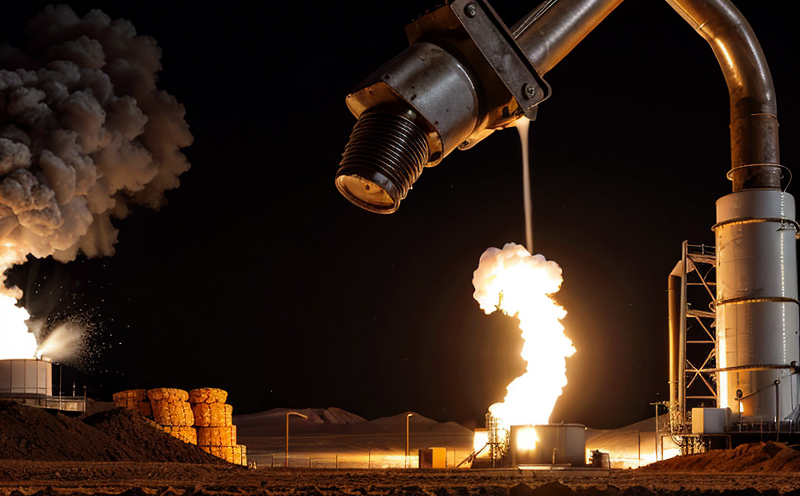ISO 19579 Coal Quality and Calorific Value Testing for Trade
The ISO 19579 standard is a critical benchmark in ensuring consistent and reliable quality control within the global coal market. This service focuses on the precise measurement of calorific value and other key parameters, such as ash content, sulfur content, moisture, volatile matter, and fixed carbon. These metrics are essential for accurate trade negotiations, ensuring compliance with international standards, and maintaining fair market practices.
Coal is a significant energy source globally, and its quality can vary widely depending on the type of coal (anthracite, bituminous, sub-bituminous, lignite) and mining location. ISO 19579 provides a standardized method for assessing these qualities to ensure that coal shipments meet buyer specifications. The standard is particularly important in international trade where variations in coal quality can lead to disputes over payment or delivery.
The testing process under ISO 19579 begins with the collection of representative samples from various parts of the shipment or mine. These samples are then prepared according to specific protocols, ensuring that they accurately reflect the composition and characteristics of the entire batch. The calorific value is determined by bomb calorimetry, a method which measures the heat released when coal burns in oxygen under controlled conditions.
Other parameters such as ash content, sulfur content, moisture, volatile matter, and fixed carbon are also measured using techniques like gravimetric analysis for ash content and titrimetric methods for sulfur. These tests provide critical insights into the calorific value of the coal, which is crucial for predicting its combustion efficiency in power plants or industrial furnaces.
The results from these tests are then compiled into a comprehensive report that meets ISO 19579 requirements. This report serves as a legal document that can be used to settle disputes between buyers and sellers. It ensures that both parties have the same understanding of the coal's quality, thus promoting fair trade practices.
The importance of this service cannot be overstated in an era where global energy demand is increasing. By adhering to ISO 19579 standards, traders can ensure that their coal meets international quality benchmarks, thereby enhancing market credibility and customer satisfaction. This standard also helps in reducing the risk of disputes by providing a clear reference point for quality assessment.
Compliance with ISO 19579 is particularly beneficial for organizations involved in large-scale coal trading or those dealing with multinational buyers and sellers. It ensures that all parties are working to the same set of standards, which fosters trust and reliability within international trade networks.
Industry Applications
The application of ISO 19579 in the coal industry is vast, but it primarily focuses on ensuring the quality of coal being traded internationally. This service plays a pivotal role in several areas:
- Quality Assurance: Ensures that the coal delivered meets the specified quality criteria.
- Compliance: Helps traders comply with international standards and regulatory requirements.
- Dispute Resolution: Provides a clear, standardized method for assessing coal quality, which can be used to resolve disputes between buyers and sellers.
The service is particularly useful in industries that rely heavily on coal as an energy source. Power generation plants, steel manufacturers, and other industrial facilities depend on consistent coal quality to ensure efficient operation and minimal downtime. By using ISO 19579-compliant testing, these organizations can avoid costly disruptions and maintain their competitive edge.
In addition to the above applications, this service also supports R&D efforts within the industry. Researchers and development teams can use the standardized results from ISO 19579 testing to refine processes for improving coal quality or developing new technologies that enhance combustion efficiency.
Customer Impact and Satisfaction
- Enhanced Quality Control: Customers can trust that the coal they receive meets specified quality criteria, ensuring consistent performance across batches.
- Reduced Disputes: Standardized testing methods reduce the likelihood of disputes between buyers and sellers, leading to smoother business operations.
- Increased Efficiency: Accurate coal quality assessment helps facilities achieve higher combustion efficiency, reducing operational costs.
Clients who use our ISO 19579-compliant testing services report increased customer satisfaction due to the reliability and consistency of their products. This has led to stronger business relationships and improved market reputation for many organizations.
Environmental and Sustainability Contributions
- Emissions Reduction: Accurate coal quality assessment helps in optimizing combustion processes, reducing unnecessary emissions.
- Resource Efficiency: By ensuring that only high-quality coal is used, organizations can minimize waste and maximize resource efficiency.
The use of ISO 19579 ensures that the coal industry operates sustainably by promoting efficient energy use and minimal environmental impact. This aligns with broader sustainability goals within the global energy sector.





